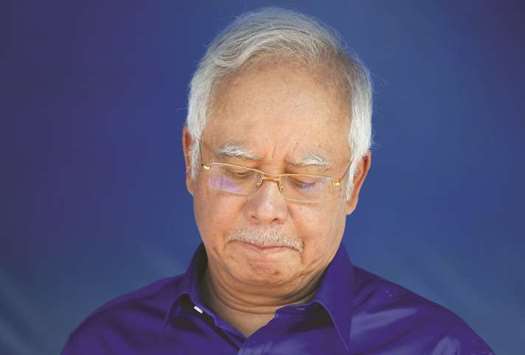With a day to go for Malaysia’s general election, politicians are battling for the crucial ethnic Malay vote that Prime Minister Najib Razak is counting on to hold off a late surge from the opposition and win another term.
The opposition is led by Mahathir Mohamad, a 92-year-old former prime minister who was once Najib’s mentor but turned against him and quit the United Malays National Organisation (UMNO) party.
The Barisan Nasional (BN) ruling coalition, which is dominated by UMNO, and Mahathir’s alliance are both vying for the votes of Malay Muslims, who account for about 60% of the population in the Southeast Asian nation.
An Islamic group, Parti Islam se-Malaysia (PAS), is also chasing these votes and — unlike the last election — it is not standing with the opposition alliance. Najib and his deputy have taken their campaign to the Malay rural heartland in recent days, playing up BN’s role in protecting Islam and promoting Malay interests.
“If we look at the behaviour of one or two people (in the opposition), we cannot be confident that they will look after our interests, especially the people in the rural areas, the interests of Islam and the interests of the Malays,” Najib told a rally on Sunday, according to state news agency Bernama.
Historically, Malays have largely been in favour of UMNO and BN because of the decades of policies favouring them in business, education and housing. Many in the ethnic Chinese and ethnic Indian minorities favour the opposition.
But a recent survey by independent pollster Merdeka Center said BN’s support among Malays has dropped by 8% in peninsular Malaysia since the 2013 general election. Peninsular Malaysia is home to three-fourths of the country’s electoral districts while the rest are in Malaysia’s part of Borneo island.
The fall in BN’s support varied across states, it said. In Johor, one of Malaysia’s most populous states, it had fallen as much as 21%, it said.
“There will definitely be significant movement of Malay voters across the (political) divide. I expect the margin of victory to be fine,” said Rashaad Ali, an analyst with the S Rajaratnam School of International Studies in Singapore.
Najib is widely expected to retain power, thanks to a first-past-the-post-system that doesn’t require winning the popular vote, and support in rural areas, despite worries about the rising cost of living and a financial scandal at state fund 1MDB. The opposition has accused BN of playing “dirty” tricks to win the election, including the recent redrawing of electoral boundaries that they say favours Najib’s coalition. BN denies the accusations.
Najib’s press secretary yesterday urged Malays to stay loyal to BN, and said the largely-Chinese Democratic Action Party (DAP), which holds a vast majority of seats in the opposition coalition, was using Mahathir to divide them.
“DAP are using the nonagenarian as camouflage to split the Malay vote. Should they win, they will never let Mahathir become prime minister — they know him too well,” Tengku Sariffuddin said in a statement.
Swinging the Malay vote away from UMNO, however, will not be easy, especially in areas of “Felda settlers”, Malays who work for the national palm plantation operator Federal Land Development Authority (Felda) and have been a rock-solid votebank for the ruling coalition.
At Gedangsa, a Felda settlement about 100km north of Kuala Lumpur, a campaign rally by local opposition leaders on Friday struggled to attract more than 70 residents.
“Even without thinking, they will vote for UMNO,” said Zainal Amri, a 63-year-old settler. “Voting UMNO is a tradition for Malays.”
Still, corruption scandals, allegations of mismanagement and delays in payments to settlers by Felda have prompted some to switch to the opposition, a few people at the rally told Reuters. Felda Chairman Shahrir Abdul Samad, who is also an UMNO division chief in Johor, said the government-run agency has offered grants and will restructure debt to reduce the financial burden for settlers.
He said the opposition’s hopes of unleashing a “Malay tsunami” by “attacking prominent Malay institutions” would not succeed.

Malaysian Prime Minister Najib Razak of the ruling coalition party Barisan Nasional gestures during a campaign event ahead of the upcoming 14th general elections, in Pekan, Pahang. Malaysia’s 14th general election will be held tomorrow.
